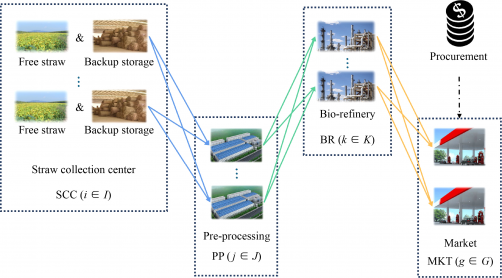A team of researchers from Tianjin University has unveiled a novel approach to designing resilient biofuel supply chains. Their study, titled “Optimization Design Method for Biofuel Resilient Supply Chain Considering Node Disruption Impacts in a Two-Stage Stochastic Programming Framework,” was published in Frontiers of Chemical Science & Engineering, Volume 19, Issue 6. This research addresses the growing complexities and uncertainties faced by biofuel supply chain systems, particularly in the context of increasing global economic interactions.
As businesses navigate the challenges of a rapidly evolving market, the risk of disruptions within supply chains has risen significantly. This has prompted a critical need for effective strategies that not only enhance security but also ensure competitiveness in the biofuel sector. The authors of the study emphasize that traditional supply chain design methods have largely fallen short in quantifying and managing disruption risks, which has hindered efforts to create more resilient systems.
To tackle these challenges, the researchers introduce the Node Disruption Impact Index. This innovative index features adjustable parameters that reflect cost changes associated with disruptions at various nodes within the supply chain. By allowing for customization, this approach helps identify nodes that present different levels of risk while facilitating a balance between economic benefits and overall resilience.
Advancing Supply Chain Optimization
The study further develops a comprehensive two-stage stochastic programming model that applies the Node Disruption Impact Index. This model is designed to account for fluctuations in node uncertainties and includes mechanisms to respond to potential high disruption risks. The applicability of this model was tested in a biofuel supply chain case study conducted in Guangdong Province.
Results from this application revealed that the proposed model outperformed traditional approaches, particularly when high-risk nodes were disrupted. The findings indicate that this new method not only enhances cost-efficiency but also improves market delivery rates, confirming its effectiveness in optimizing resilient supply chains within the biofuel industry.
The implications of this research extend beyond theoretical frameworks, presenting practical applications for businesses aiming to strengthen their supply chain management strategies. By leveraging the insights from this study, enterprises can better prepare for disruptions, ensuring a more robust and competitive positioning in an increasingly volatile market.
For those interested in further details, the full paper is accessible at: https://journal.hep.com.cn/fcse/EN/10.1007/s11705-025-2548-z.
